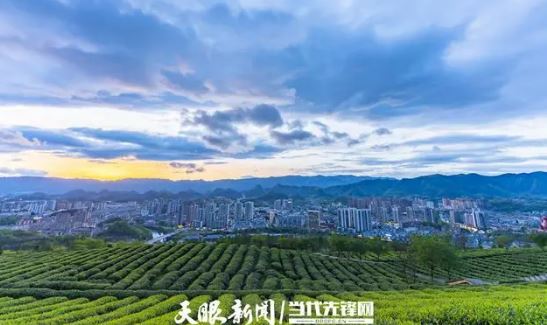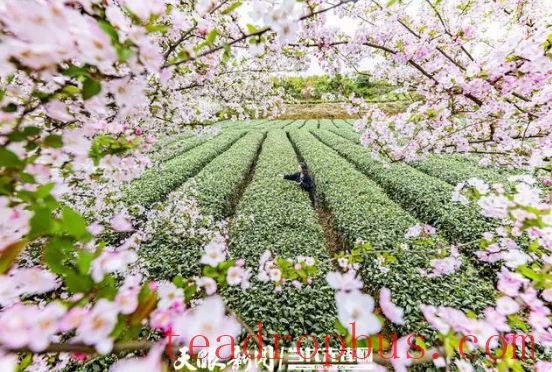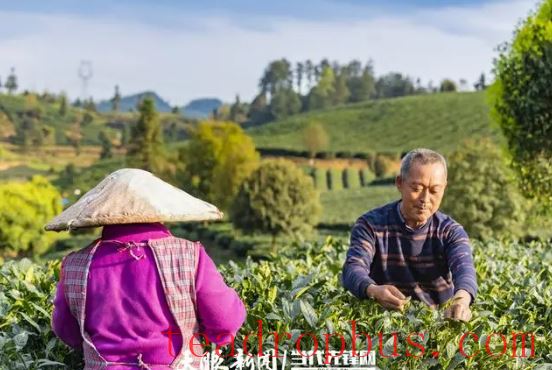Implementing a comprehensive rural revitalization, industrial revitalization is fundamental. President Xi Jinping emphasizes that industrial revitalization should be the top priority in rural revitalization.
The Guizhou mountains and waters are endowed with natural beauty and treasures. On the hills, there are over 7 million mu of Tea gardens, acting as a “green ATM” for the people. Tea is the “ancient divine tree” of the East and the “green treasure” of Guizhou. With its “eight parts mountain, one part water, and one part field,” Guizhou possesses excellent ecological conditions for developing a tea industry, being the only province at high altitude, low latitude, often shrouded in mist, and free from pollution, making it an entire plateau tea region.
Guizhou has a long history of tea cultivation. After years of relentless effort, it has become one of the largest tea-producing provinces in China. It has also optimized its marketing and distribution environment, making great strides in promoting Tea culture, industry, and technology. These efforts have yielded impressive results across the entire tea industry chain, and “industrial prosperity” has brought about “prosperous people and beautiful ecology.” This harmonious coexistence of green mountains and productive lands has firmly laid the foundation for a comprehensive rural revitalization.
“Short and stout, white flowers bloom, greening thousands of hills, enriching countless homes.” As the season of east wind brings verdant green and the aroma of spring tea, let's delve into Guisan's “Observing Tea” series and explore the stories of tea prosperity and wealth. Share the laughter and joy along the entire tea industry chain.
Please share Guisan “Observing Tea” Series Report ④: Meitan Chapter in this issue.

In Meitan, the tea industry blurs the boundaries between urban and rural areas. Photo courtesy of the Meitan County Media Fusion Center.
On the peak of Tianhu Park in the center of Meitan City, next to the Meijiang River, stands a striking terracotta “giant Teapot.”
This landmark building, known as the “World's Largest Teapot,” stands 73.8 meters tall, covering an area of more than 5,000 square meters. Completed in May 2006, it entered the Guinness World Records and is now used as a tea culture exhibition hall.
“The Meijiang River surrounds Meitan City, concealing a treasure basin. Who can decipher its secret? The camel carries gold and Silver.” Many years ago, this riddle circulated in Meitan County. The appearance of the “World's Largest Teapot” revealed the answer.
Meitan County, located at 27 degrees north latitude, shares the world's three golden tea-producing belts with Darjeeling in India and Wuyi Mountain in Fujian Province, producing clean and high-quality tea. In 2025, Meitan County has 600,000 mu of tea gardens, with a total tea production value of 7.503 billion yuan and a comprehensive income of 18.012 billion yuan. Over 300,000 tea farmers have an average annual increase in income of 13,000 yuan. For four consecutive years, it has ranked first among “China's Top 100 Tea Counties,” nurturing two renowned teas, “Meitan Cuiya” and “Zunyi Red.”
A typical western agricultural county becoming the largest tea-producing county in the country, the secret to its development lies in leveraging the historical heritage of tea culture and technology, persistently strengthening the tea industry, and using a single “golden leaf” to compose a symphony of economic prosperity, wealth for the people, and ecological beauty. This demonstrates that green mountains can indeed be golden mountains.
“One Leaf Becomes an Industry” – Beautiful Life
“To be a happy farmer in Meitan!” In recent years, many outsiders who have visited Meitan's countryside have been captivated by the idyllic scenery of prosperous industries and a beautiful environment, envying the “green, rich, and beautiful” life in Meitan's rural areas.
In mid-April, Meitan County is in the midst of the spring tea harvest season. From the villages to the hills, the bustling figures of tea pickers, the lively transactions in the fresh tea market, and the whirring machines in Tea processing factories link together to form a vibrant landscape of tea production.
Industrial prosperity brings a beautiful life. Journalists delved deep into local households, marveling at the well-connected transportation, children attending school in the city, farmers leading a “two-way” life, balancing tea cultivation and child-rearing, and the vivid stories that serve as footnotes to the life of “happy farmers.”

Construction demonstration zone of European standard tea gardens in Xinglong Town, Meitan County. Photo courtesy of the Meitan County Media Fusion Center.
“Since the start of the spring tea harvest, I've been doing this from Monday to Friday. After dropping off my grandson at kindergarten, I rush back home on the bus, arriving in about 50 minutes, to help my wife manage our tea garden and pick fresh tea leaves.” On the morning of April 16, after sending his grandson to kindergarten in Meitan City, Fan Chaojiang boarded a bus heading back to Suyang Village in Fuxing Town.
As a tea farmer in the core tea-producing area of Meitan, Fan Chaojiang has planted over 10 mu of tea, and he and his wife earn around 80,000 yuan annually from the “green bank” of the tea industry.
A year ago, when his grandson reached school age, Fan Chaojiang's son, who worked outside the province, bought a house in the city so his child could attend school there. Since then, Fan Chaojiang has led a “two-way” life, rushing back home early in the morning to pick tea and returning to the city every evening after selling the fresh tea leaves to pick up his grandson.
“It's definitely better for my grandson to go to school in the city, and picking tea at home generates more income than working in the city,” Fan Chaojiang candidly told reporters the reason for his daily commute.
According to Wan Yongmei, the Party branch secretary of Suyang Village, around 300 villagers like Fan Chaojiang shuttle between the village and the city for their children's education.
“Our village has 14,000 mu of ecological tea gardens, with each household averaging over 10 mu. Last year, the per capita income of the whole village was over 22,000 yuan. Many parents who bring their children to the city are unwilling to work odd jobs there and prefer to return home to pick tea,” Wan Yongmei said.
As one of the first rural reform pilot zones in the country, the smooth rural transportation and thriving tea industry in Meitan have blurred the boundaries between urban and rural areas. Many tea farmers enjoy the city's abundant medical, educational, and cultural services while guarding their “money-making tree” of tea, leading to the emergence of “two-way” farmers, a new phenomenon of urban-rural integration.

Tea farmers in Suyang Village, Fuxing Town, Meitan County, picking tea, which has brought them a happy life. Photo courtesy of the Meitan County Media Fusion Center.
The “money-making tree” of tea has enriched the local villagers of Suyang Village and provided employment opportunities for many “outsiders.”
From five to seven o'clock every afternoon, the bus stop near the fresh tea market in Suyang Village is bustling with passengers.
Cai Xingmin, a tea picker from Liuli Village, Longquan Town, Fenggang County, said that every tea-picking season, she invites her sisters from the village to pick tea together. At 51 years old, she has been helping people pick tea in Suyang Village for seven or eight years.
“This job is easier and more flexible than working outside. During the spring tea season, I can earn nearly 200 yuan a day, and if I'm diligent, I can make over